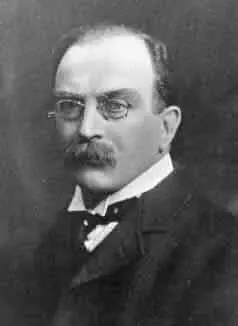On July 11, 1798 in Celtic History
Sir joseph larmor, born

Sir Joseph Larmor FRS FRSE (11 July 1857 – 19 May 1942) was an Irish and British physicist and mathematician who made breakthroughs in the understanding of electricity, dynamics, thermodynamics, and the electron theory of matter.
His most influential work was Aether and Matter, a theoretical physics book published in 1900.
He was born in Magheragall in County Antrim the son of Hugh Larmor, a Belfast shopkeeper and his wife, Anna Wright.
The family moved to Belfast circa 1860, and he was educated at the Royal Belfast Academical Institution, and then studied mathematics and experimental science at Queen’s College, Belfast (BA 1874, MA 1875), where one of his teachers was John Purser.
He subsequently studied at St John’s College, Cambridge, where in 1880 he was Senior Wrangler (J. J. Thomson was second wrangler that year) and Smith’s Prizeman, getting his MA in 1883.
After teaching physics for a few years at Queen’s College, Galway, he accepted a lectureship in mathematics at Cambridge in 1885.
In 1892 he was elected a Fellow of the Royal Society of London, and he served as one of the Secretaries of the society.
He was made an Honorary Fellow of the Royal Society of Edinburgh in 1910.
Larmor proposed that the aether could be represented as a homogeneous fluid medium which was perfectly incompressible and elastic. Larmor believed the aether was separate from matter.
He united Lord Kelvin’s model of spinning gyrostats (see Vortex theory of the atom) with this theory.
Larmor held that matter consisted of particles moving in the aether. Larmor believed the source of electric charge was a “particle” (which as early as 1894 he was referring to as the electron).
Larmor held that the flow of charged particles constitutes the current of conduction (but was not part of the atom).
Larmor calculated the rate of energy radiation from an accelerating electron. Larmor explained the splitting of the spectral lines in a magnetic field by the oscillation of electrons.
Larmor also created the first solar system model of the atom in 1897.
He also postulated the proton, calling it a “positive electron.” He said the destruction of this type of atom making up matter “is an occurrence of infinitely small probability.”
In 1919, Larmor proposed sunspots are self-regenerative dynamo action on the Sun’s surface.
Related Content

Shane Patrick Lysaght MacGowan, lead singer of the Pogues, died
Shane Patrick Lysaght MacGowan is an Irish-English musician and songwriter, best known as the lead singer and songwriter of the punk band The Pogues.
Read More
St Machar Day, patron saint of Aberdeen
Saint Machar is the Diocesan Patron Saint of Aberdeen; the Feast Day being observed on 12th November.
Read More
Oíche Shamhna - Cetlic New Year Eve (Halloween)
In Scotland and Ireland, Halloween is known as Oíche Shamhna, while in Wales it is Nos Calan Gaeaf, the eve of the winters calend, or first. With the rise of Christianity, Samhain...
Read More
ALBAN ELFED (Welsh Bardic name for autumn equinox)
Alban Elued, The Light of the Water, the first day of Autumn, was also called Harvesthome. Observed on September 21, the Autumnal Equinox was the day when the sun again began to...
Read More
Feast day of St. James
Guinness St. James Gate Since mediaeval times, Dubliners held an annual drinking festival in the Saint’s honor. Fittingly, Guinness chose St. James’ Gate as the site for their...
Read More
John Davie Burgess, King of the Highland Pipers, died at age 71.
John Burgess died on June 29, 2005 at the age of 71.
Read More
No location specified

No location specified

No location specified

No location specified

No location specified

No location specified

No location specified

No location specified